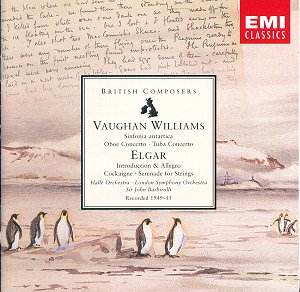These are mono recordings made between 1949 and 1957.
They sound very clean and clear though the second discís items are not
quite as good.
The Oboe Concerto is an exceptionally joyous
performance and I urge you, if sampling the disc, to try the supple
and perfectly balanced finale (tr. 3 CD1). Evelyn Rothwell's oboe playing
is reedily plaintive and the instrument is brawly blown. This must be
heard by any admirers of this work. The RVW concertos are often seen
as a bit of an excrescence. This version carries subtle spiritual weight
and glows in Technicolor serenity. If you want a good stereo version
then go for John Williams in the Berglund-conducted recording also on
EMI. Rothwell's is however a great performance.
The gruff Tuba Concerto is here played by its
dedicatee and is historically significant for that reason alone. Catelinet
has a breathy-lippy tone which I found disconcerting when compared with
the few other recordings. This is not a great performance though it
is pleasing. If you want a really good version then the one André
Previn made in the 1960s with the LSOís tuba principal John Fletcher
is worth tracking down (RCA/BMG).
The Antartica was premiered by Barbirolli
in Manchester on 14 January 1953, then given its London first at the
Festival Hall in February. This recording was made that summer. The
music was written between 1949 and 1952 after the premiere of the film
Scott of the Antarctic in 1948. This version must therefore be
regarded as another historic document. It sounds quite clean; its impact
is not garish. Woodwind are emphasised by the balance. Barbirolli really
pitches in with a gruff fast sea-swell of a tempo at the opening of
the finale. Overall though I still wonder about this work as a symphony.
It is in some ways better thought of as a chilly concerto for orchestra
where pleasure comes from the many vivid pictorial episodes.
The second disc mixes Elgar and Vaughan Williams. The
Wasps is raced forward with Barbirolli pushing and urging forward.
Repose and serenity comes in the great soul-widening theme at 3.40.
This is a most vital performance. The Greensleeves Fantasia is
restful and luxurious. It leads with an ineluctable spontaneity into
the Dives and Lazarus Variants - a work which, in Barbirolli's
hands, is almost sultry. Full advantage is taken of the richly decked
harp accompaniment. Listening to this Barbirolli would have made an
ideal interpreter of Suk's Wenceslas Chorale.
In the Elgar works Barbirolli lays into the contours
with an emphatic jaggedness that makes the sweeter converse of the solo
quartet the more effective. Such deliberate accentuation sounds wonderfully
gruff and fresh; would that the recording which is not at all bad were
even better otherwise it might have given the Sinfonia of London version
a run for its money. Such slam and exciting attack ... and such portamenti.
The Serenade's Edwardian pallor is flattered by Barbirolli
and his precise care. Cockaigne is as cocky and rambunctious
as you might hope for. It is only a specialist item because of the sound
quality which has the higher violin passages sound as if they are suffering
from the aural equivalent of fine split-ends.
Rob Barnett
